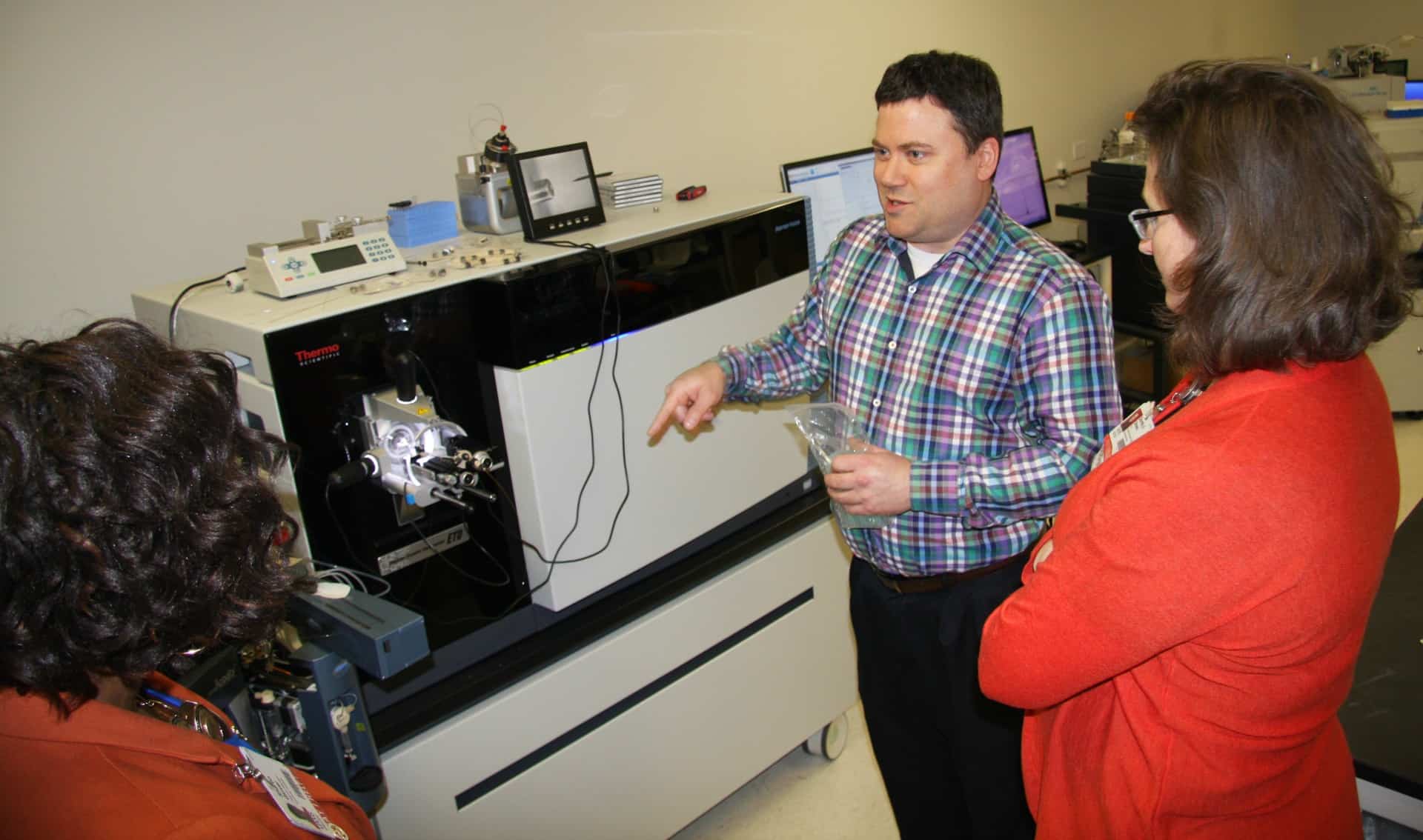Showcase Highlights Expertise Available from Core Facilities
| March 3, 2017 | By pooling resources through UAMS’ Core Facilities and Technical Services, more technology, tools and collaborative services are available to investigators than ever before – resulting in exciting research opportunities for Arkansas.
The core facilities were featured at the Showcase of Medical Discoveries: A Focus on Core Facilities on Feb. 22 — the 17th in a series sponsored by the College of Medicine. About 150 researchers, physicians, staff and students attended the event, held at the UAMS Winthrop P. Rockefeller Cancer Institute.
“Even five, 10 years ago, the idea that some guys in Little Rock could sequence a genome for you was unthinkable. Now, it’s reality. So much more is available, and if you’re not keeping up with all the fields, you might not know what is possible. That is what the core structure is for, and events like these get the word out. Collaborative research using core facilities really is the wave of the future,” said Stewart MacLeod, Ph.D., technical director of the Genomics Core and assistant professor in the Department of Pediatrics in the College of Medicine.

Sam Mackintosh, Ph.D., points out peaks measured by the mass spectrometer as he explains what kind of experiments are done in the Proteomics Core.
The core facilities are open to researchers on campus and off. Under a pay-per-use structure, investigators can access specific laboratory tools or analytical services, tapping into technologies not available in their own labs or skills they may not possess. All 14 cores were featured at the showcase, in areas such as cell analysis, biomarker analysis, genetic analysis, molecular structure analysis, tissue analysis, animal research, clinical research and communications expertise:
- Flow Cytometry Core
- DNA Sequencing Core
- Irradiation and Animal Core
- Genomics Core
- Experimental Pathology Core
- Tissue Biorepository and Procurement Service
- Brain Imaging Research Center
- Bioanalytical Core
- Digital Microscopy Core
- Ultrasound Imaging Core
- Proteomics Core
- Transgenic Mouse Core
- Molecular Imaging Core
- Science Communications Core
The event coincided with the rollout of iLab Operations Software, which streamlines the process of filling UAMS Core Facilities and Technical Services requests.
“It’s an integrated software package where investigators can see all the core facilities in one place and select what they want. There is tracking for the administrators so they can see which services are the most popular and manage their cores accordingly. It’s part of a general overhaul involving better communication, better online access and improved advertising of everything we have to offer here through the UAMS cores,” said Alan Tackett, Ph.D., who has been assisting with the iLab rollout and is co-director of the Proteomics Core.
As part of the showcase, eight of the cores participated in an open house.
Sam Mackintosh, Ph.D., research assistant professor in the Department of Biochemistry and Molecular Biology in the College of Medicine, hosted the Proteomics Core tour, highlighting its three mass spectrometers, which are models from 2011-2015 and represent about $2.5 million worth of technology. The core stays busy, running 24-7 to analyze several hundred samples a month, with about 20 percent of the projects coming from outside UAMS.
The Proteomics Core – like many of the other cores – aims to be a one-stop shop for researchers. Staff can not only examine the samples, but they can help investigators plan their project, design their experiments and analyze their results.
“We aim to help people from beginning to end, from planning to publication,” Mackintosh said. “We are always expanding what we provide to get better and better at that goal.”
Specifically, at the Proteomics Core, staff use mass spectrometry to help the researcher identify proteins. For example, mass spectrometry can highlight protein differences between a normal sample vs. a cancerous one. They work on research and clinical projects and can handle samples from humans, animals, bacteria, viruses – anything with protein.
Proteomics Core Co-Director Ricky Edmondson, Ph.D., who is also an associate professor in the UAMS Myeloma Institute, said it’s important to get the word out about the cores and the expertise they provide.
“A lot of people aren’t keeping up with the latest proteomics literature or the capabilities offered by the other cores. How can they? All of that takes time. But we are. We’re continually adapting and staying on top of the latest in our fields,” Edmondson said.
The Showcase of Medical Discoveries is organized by the office of Vice Chancellor for Research Lawrence Cornett, Ph.D., and supported by UAMS College of Medicine Dean Pope L. Moseley, M.D. It originated from discussions about the faculty’s desire for more opportunities to discuss their scientific work in a social setting.
